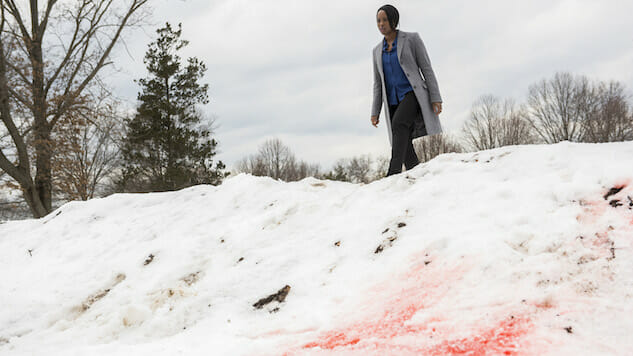Veena Sud Talks Seven Seconds and Why Now Is the Right Time to Tell This Story
Photo: Jojo Whilden/Netflix
The pilot episode of Seven Seconds, which premiered on Netflix last Friday, ends with the sight of bright red blood spattered against the stark white snow. It’s the blood of teenager Brenton Butler, hit by a car and abandoned on the side of the road. The haunting image is devastating.
For executive producer Veena Sud, it was imperative that the series, set in New Jersey, take place in winter, when snow covers the ground.
“That blood remains a testimony to what happened there and doesn’t go away,” she tells Paste. She also wanted to make sure the series addressed how long bodies are often left out after a tragedy has occurred. “A child could lay out there in full view of neighbors, family, mothers. It felt like that part of the story is what I really wanted to focus on. How can that happen and what message does that send to the community, to this country, about whose lives and whose bodies matter?”
In the spring of 2015, having recently wrapped her series The Killing—which ran for three seasons on AMC before moving to Netflix for its fourth and final season—Sud would turn on the television and see yet another story of a black man or child being shot by the police.
“Very quickly,” she says, “I realized this is a story I wanted to tell and I wanted to tell it in a very honest and unflinching way.”
In the ten-episode series, white narcotics officer Pete Jablonski (Beau Knapp) kills black teenager Brenton Butler not with a gun but by hitting with him with his car. Rushing to the hospital to see his pregnant wife, Pete, who is looking at his phone, doesn’t see Brenton on his bike. When Pete’s fellow officers arrive, his sergeant, Michael DiAngelo (David Lyons), convinces/orders him to flee the scene. An elaborate cover-up ensues; assistant prosecutor KJ Harper (Clare-Hope Ashitey) immediately senses that something isn’t right, while Brenton’s devastated parents (Regina King and Russell Hornsby) search for answers.
But why shy away from the reality of police killing black men and children with guns? Why make it a car accident?
“It was more of being interested in exploring the human story behind all those news headlines and doing a deep dive into all the players involved in these killings,” she says. Focusing on the characters and reserving judgment on them prevents the story from becoming a “political speech” Sud explains.
“It was our mission as writers from the very beginning to not judge, to simply listen, to write human truths to inhabit the skins of every single character and walk in their shoes,” she says. “There are enough headlines that tell very broad sweeping stories. We wanted to do deep dives into, how does a family deal with this? How does a man who thinks of himself as a good man and worked his entire life to be moral deal with this? How does a woman like KJ Harper who has given up on life get her soul back over the course of this story?”
-

-

-

-

-

-

-

-

-

-

-

-

-

-

-

-

-

-

-

-

-

-

-

-

-

-

-

-

-

-

-

-

-

-

-

-

-

-

-

-








































